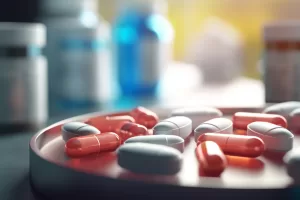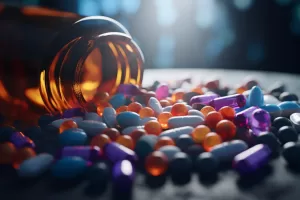It is hard to find a person who has never been prescribed antibiotics in their life. And there is a lot of speculation about alcohol consumption and antibiotics. Some people say it is a big no-no, and the consequences can be devastating. Some are confident that nothing bad will happen. And it is tempting to take a glass while being on medication to cheer yourself up or support a party fun.
So today, we are figuring out once and for all: can you mix alcohol and antibiotics?
What are Antibiotics
Antibiotics, or antibacterial drugs, are medications created to treat diseases caused by harmful bacteria. They come in a lot of forms:
- medicine for oral use: pills, tablets, and liquids (the latter mostly used for kids);
- antibiotics for parenteral treatment: intramuscular or intravenous injections;
- topical medicine: creams, lotions, and ointments, to treat bacterial skin infections.
How antibiotics work in the body
There are two ways how antibacterial treatment helps you to get rid of a nasty infection. They are connected to the compound’s mechanism of action:
- Bactericidal effect is when the drug is able to harm pathogenic cells directly, eventually killing them. For example, beta-lactam antibiotics, such as amoxicillin, prevent the formation of cell walls which leads to its lysis and death.
- Bacteriostatic effect inhibits certain processes in a cell, such as DNA replication or protein synthesis. Affected cells cannot reproduce, and it is easier for the immune system of the body to deal with the infection. Linezolid and tetracycline are examples of bacteriostatic antibiotics.
Can I Take Antibiotics with Alcohol?
While nothing particularly horrible will come of this, it is recommended to avoid drinking alcohol while being on an antibacterial treatment. Mixing alcohol and antibiotics can worsen your well-being, impede recovery, and put an additional strain on your system.
Alcohol and Antibiotics Interactions
Different medications interact with alcohol differently. If in doubt, you can always consult your doctor or a local pharmacist about the possible outcome of taking two substances together. Let us review some risks you expose yourself to when you are taking antibiotics and drinking alcohol in parallel.
Antibiotic effectiveness
Some antibiotics, such as doxycycline, have a much shorter half-life in patients who drink alcohol. The longer the consumption term, the less time medicine stays in the body. This affects the efficacy of the drug. Moreover, if the medication has been eliminated from the body before the end of the disease, the bacteria can become resistant to further treatment with this drug.
A study that investigated antibiotics and alcohol interaction revealed that in some patients, the concentration of doxycycline has fallen even below the therapeutic values meaning total ineffectiveness.
Mixing side effects
Both antibiotics and alcohol have side effects. So, when mixing the two, you increase the risk of developing an unpleasant adverse reaction, double the load you put on the organs that cleanse your body (liver and kidneys), and your own resilience takes a heavy hit.
Antabuse Effect
Antabuse (compound name disulfiram) is a drug indicated to treat alcoholism. When the patient who takes Antabuse has a drink, something called a disulfiram reaction occurs. The body cannot normally process alcohol and becomes intoxicated with an interim product of catabolism, acetaldehyde. This leads to a variety of undesirable symptoms, such as nausea and vomiting, headache, heart palpitations, etc.
Taking some antibacterial drugs, such as metronidazole or tinidazole, and alcohol causes a similar effect. This occurrence is called a disulfiram-like reaction because the interaction happens with another compound (antibacterial medicine) but the result is the same.
Increased Side Effects
If the patient develops the same adverse reaction to drinking and taking the antibiotic, it creates a synergy that amplifies the negative effect on the body. For instance, amoxicillin is known to increase the risk of gastrointestinal disorders, such as upset stomach and diarrhea, especially when paired up with clavulanic acid to boost its effect. And alcohol irritates the inner lining of the stomach and interferes with gastric secretion and muscle movement, with the potential to cause diarrhea, gastritis, and even GI bleeding.
Delayed Recovery
Alcohol affects a variety of aspects of your body functioning which may interfere with your recovery from an infectious disease. There are studies that confirm that spirits directly suppress the immune response of the body.
The effect can also be indirect. Let us suggest that the patient takes UTI antibiotics and alcohol together. Every guide on treating a urinary infection will mention the necessity of good hydration so that bacteria can be flushed from your body more quickly. And alcohol dehydrates the body.
Liver and Kidney Damage
The liver and kidneys are organs that eliminate toxins and waste from the organism. Alcohol consumption increases the load on both and has been associated with liver and kidney injuries. Antibiotics are also processed by these organs and sometimes can affect them negatively, especially when taken incorrectly. The combination of antibiotics and alcohol causes a higher risk of damage.
Impact on Decision-Making
Inebriation can push a person to unnecessary risks and destructive decisions. For example, let us imagine a person under an antibacterial treatment for an STI. They should avoid sexual contact, but when intoxicated, they can engage in such activities. A simpler example is someone struggling with a respiratory tract infection but having fun outdoors in winter because, again, they had alcohol.
Summary
The risk of negative consequences of mixing antibiotics and alcohol is not a myth. Recommendations to avoid drinking while treating a bacterial infection are backed by studies and the understanding of how these compounds work in the body.
FAQ
Which antibiotics can you not drink alcohol with?
The best is to avoid drinking with any antibiotics. Some, however, put you at a higher risk of strong side effects and less treatment efficacy. Examples of them would be metronidazole and doxycycline.
How long should I wait to drink alcohol after taking antibiotics?
When in doubt, consult your healthcare professional. A general recommendation is to wait until the treatment is finished.
Is it OK to drink alcohol while taking amoxicillin?
This increases the risk of developing a heavier GI disorder, such as diarrhea or stomach ache.
What can you not take antibiotics with?
The list of interactions can be found on the medicine’s label. You can also ask your doctor or a pharmacist for guidance.



